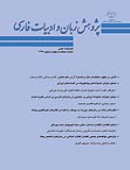بازنمایی مؤلفههای مذهبی گفتمان انقلاب اسلامی در رمانهای شاخص جنگ
محورهای موضوعی : پژوهشهای ادبیات کلاسیک ایرانهاشم صادقی محسن آباد 1 * , منوچهر اکبری 2
1 - دانشگاه نیشابور
2 - دانشگاه تهران
کلید واژه: رمان جنگ گفتمان انقلاب اسلامی بیناگفتمانیت ایثار شهادت.,
چکیده مقاله :
هدف این پژوهش، بررسی شاخصه ها و مؤلفه های مذهبی بازتولیده شده در رمان جنگ بر مبنای نظریة تحلیل گفتمان است. به این منظور هویت مذهبی رزمندگان در رفتار با اسرا و پیش فرض های گفتمانی و نگرش آنها نسبت به مقوله هایی همچون ایثار و شهادت، بر مبنای آرای بازتاب یافته در رمان های شاخص جنگ، احصا و بررسی شده است. نتایج تحقیق نشان می دهد که بیناگفتمانیتِ رمان جنگ از ترکیب آموزه های مذهبی و شیوه های راهبردی دفاع حاصل شده است. در این رمان ها، گفتمان انقلاب اسلامی با دال های ایدئولوژیک مبتنی بر مذهب نظیر جهاد، ایثار، شهادت و...، نظام معنایی مذهبی را مفصلبندی نموده است و به پشتوانة الگوسازی واقعة عاشورا، استناد به قرآن، کاربست تعابیر مثبت در باب شهادت و تبریک آن، معنای نشانه ها و دال های گفتمانی را تثبیت نموده و به هژمونیک شدن گفتمان یاری رسانده است.
This study has aimed to examine the religious characteristics represented in Persian war novels from the perspective of Critical Discourse Analysi. To do so, the religious identity of warriors in their conduct with prisoners of war, discursive presuppositions about such issues as sacrifice and martyrdom, and the attitude of warriors towards such issues as represented in Persian prominent war novels have been analyzed. The results of the study revealed that the interdiscursivity of Persian war novels is composed of religious teachings and defense strategies. Furthermore, it was found that the Islamic Revolution discourse has articulated a religious semantic system based on Islamic ideological signifiers such as Jihad, sacrifice, martyrdom etc., and that it has consolidated the meaning of discursive signifiers by modeling the ‘eventof Ashoura’ , reference to the Quran, and utilising positive comments about martyrdom and consecration of that, thus facilitating the hegemonization of this discourse.
قرآن کریم.
بوتول، اریک (1377) «به ¬سوی قرائتی نو از مفهوم شهادت از منظر انسان¬شناسی و جامعه¬شناسی»، نامة پژوهش، ویژه دفاع مقدس، سال سوم، شماره 9، صص 191- 205.
حسن¬بیگی، ابراهیم (1389) ریشه در اعماق، چاپ چهارم، مشهد، ملک اعظم.
حنیف، محمد (1378) «ده¬سال رمان و داستان بلند جنگ»، ادبیات داستانی، شماره 51، صص 84- 113.
---------- (1386) جنگ از سه دیدگاه، تهران، صریر.
سرشار، محمدرضا (1373) نیم¬نگاهی به هشت سال قصه¬نویسی جنگ، تهران، سوره.
سرشار، محمدرضا و دیگران (1378) «نشست و نگاه»، ادبیات داستانی، سال یازدهم، شماره 73، صص 8-23.
سعیدی، مهدی (1395) ادبیات داستانی جنگ در ایران، تهران، پژوهشگاه علوم انسانی و مطالعات اجتماعی.
سلطانی، سید علیاصغر (1387) قدرت، گفتمان و زبان، سازوکارهای جریان قدرت در جمهوری اسلامی ایران، چاپ دوم، تهران، نشرنی.
شفائی هریسی، محمدکاظم (1391) «نقش مذهب در دفاع مقدس»، پژوهشنامه دفاع مقدس، سال اول، شماره 4، صص 137-158.
فتاحی، حسین (1393) عشق سال¬های جنگ، چاپ نهم، تهران، قدیانی.
فراست، قاسمعلی (1367) نخل¬های بی¬سر، تهران، امیرکبیر.
فرکلاف، نورمن (1379) تحلیل گفتمان انتقادی، ترجمه فاطمه شایسته و دیگران، تهران، وزارت فرهنگ و ارشاد اسلامی.
لاکلاو، ارنستو و شانتال موف (1392) هژمونی و استراتژی سوسیالیستی، به سوی سیاست دموکراتیک رادیکال، ترجمه محمد رضایی، تهران، ثالث.
متقی، ابراهیم و مصطفی کریمی (1392) «بررسی مفهوم شهادت در دوران دفاع مقدس با رویکرد تحلیل گفتمان»، پژوهشنامه دفاع مقدس، سال دوم، شماره 6، صص 121-146.
موسوی خمینی، روح¬الله (1379) صحیفه¬ نور، مجموعه رهنمودهای حضرت امام خمینی (قدس¬ سره الشریف) تهران، وزارت فرهنگ و ارشاد اسلامی، سازمان چاپ و انتشارات، سازمان مدارک فرهنگی انقلاب اسلامی.
یورگنسن، ماریان و لوئیز فیلیپس (1389) نظریه و روش در تحلیل گفتمان، تهران، نشرنی.

